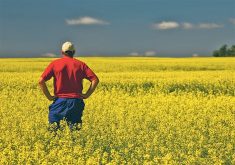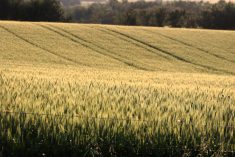SaskOilseeds’ on-farm research program, which the organization launched last year, helps farmers test their own ideas
WINNIPEG — Many products and practices on the market claim to boost yield and improve profits for growers.
Sorting through the claims and recommendations can be messy and confusing. That’s why SaskOilseeds (formerly SaskCanola) launched its on-farm research program — the Top Notch Farming trials — in 2023.
The program is bottom-up because growers ask the questions and conduct research to answer those questions.
Read Also

VIDEO: Agritechnica Day 4: Robots and more robots, Nexat loves Canada and the trouble with tariffs
Agritechnica Day 4: Robots and more robots, Nexat loves Canada and the trouble with tariffs.
“All of our ideas have come from farmers. Then we recruit other (growers) in other areas of the province that might want to do the same trials,” said Kaeley Kindrachuk, agronomy extension specialist with SaskOilseeds.
The program started in 2023 with nine canola growers participating in the on-farm research. In 2024 it expanded to 25 farms, where growers did their own research on:
- seeding rates of canola
enhanced efficiency fertilizers
split application of nitrogen, or top-up of nitrogen
nitrogen fixing biologicals
Doug Heath, SaskOilseeds’ research manager, said the on-farm trials are about verification. For instance, does a certain seeding rate produce the desired number of plants per sq. foot?
“Does it (the seeding rate) pay for itself? Does it work on their farm?” he said.
As well, farmers can use these trials to determine if something is worth $25 an acre.
“Say there is a product that (claims) to give you two extra bushels per acre and the product costs the same as the yield you would expect from two bu.,” Heath said.
“(This) allows the farmer to make the decision (on) whether it is worth it.”
The protocols for the Top Notch Farming trials are different from a strip trial. They are randomized and replicated.
“This makes the trials quite large,” says the SaskOilseeds’ website.
“However, having adequate data … is crucial to being able to provide the co-operator and other farmers with results they can be confident in.”
Randomized and replicated sounds complex, but the trials are designed so they’re easy to implement, Kindrachuk said.
SaskOilseeds collaborates with agronomists across the province, who assist growers with the on-farm research.
“We have the protocols written (and) we contract their agronomist to help them out,” Kindrachuk said.
“They (producers) work with the agronomist they normally would be working with.”
SaskOilseeds is partnering with the Western Applied Research Corp. (WARC), a non-profit in Saskatchewan, to manage the on-farm trials and analyze the data.
The results are presented for the first time at a winter banquet and participants in the trials get first look at the information.
“You’ll not only see your trial results and the combined results of the protocol, but you’ll also see the results from all other crop trials,” says the SaskOilseeds’ website.
Response from growers has been positive, Kindrachuk said.
Farmers are seeking ways to maximize production and the profitability of their land. Making better decisions about products and practices is much easier when you have on-farm data.
“Some of the comments (from growers) was that land is so expensive, I’ve got to do a better job with what I’ve got,” Kindrachuk said.
“This research helps them do that.”















